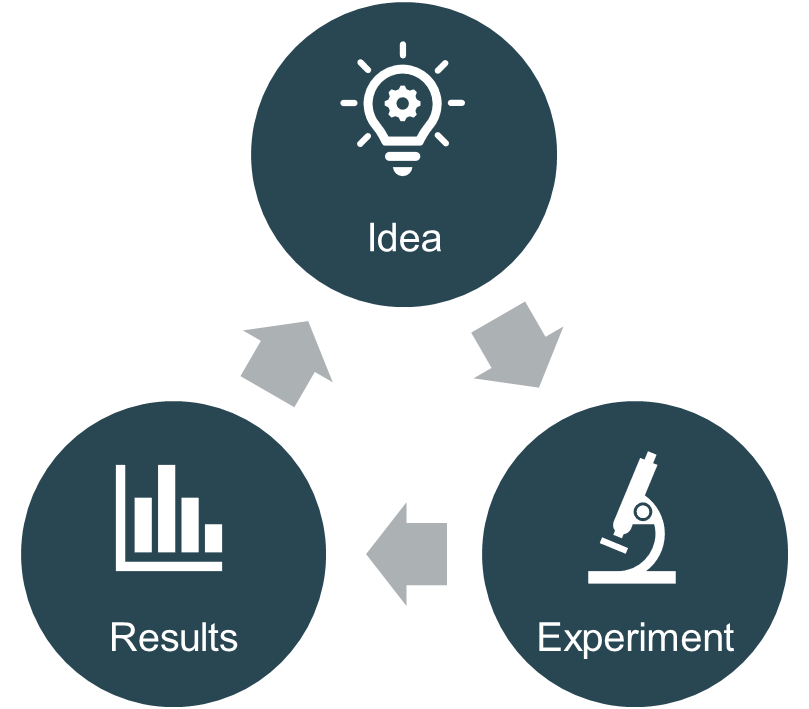July 13, 2023 | By Hannah Cheever and Jodie Lawrence
Online learning is here to stay. The benefits for students—especially increased flexibility and access—can contribute to their academic success. But students also encounter barriers to success, including feeling isolated and being unaware of where and how to seek help. And as the demands of online learning increase, resources and supports to faculty have not always caught up. Faculty report being overwhelmed and seeing increased rates of dropout, failure, and disengagement.
How can we support busy faculty to find new ways to have more students succeed in their online courses? This is a gap that the Collaborative’s Rapid Cycle Experiments (RCE) study aims to address.
The RCE study examines light touch instructional strategies that faculty can use to support their students’ learning within online courses through an accelerated evaluation timeline. These strategies target students’ self-directed learning mindsets and skills, including strategies to help students gain a sense of belonging, develop a growth mindset, know how to better seek help, and proactively manage their time. Through an accelerated evaluation timeline, the Collaborative can rapidly develop, test, and refine the strategies so faculty can integrate them immediately into their next section of their online courses.
Instructional strategies
Over the last academic year, Collaborative researchers developed two strategies to address common barriers to online learning and promote students’ development of self-directed learning skills. We intentionally collaborated with faculty members to design these strategies so they are feasible and not overly burdensome to implement while also building off these instructors’ knowledge and experience.
| Strategy | Barrier | Description | Timing |
| Three-part video series on self-directed learning skills | Need support for motivational mindsets and time management | Each video targets a self-directed learning skill (growth mindset, sense of belonging, or time management) and includes a brief reflection exercise. | Once a semester, 20 minutes per video (10-minute video and 10-minute reflection) |
| Real-time reflection prompts | Need support for time management, help-seeking, and self-reflection | Faculty send a series of reflection prompts for students to demonstrate their plans for completing weekly assignments or studying for a larger exam. | Weekly throughout a semester |
Complete the form below if you would like us to send you more information about these strategies.
Collaboration with faculty
Faculty collaboration was central to the design, implementation, and iteration of these strategies. Four institutions participated in the study for the 2022–23 school year: Bunker Hill Community College, Palm Beach State University, Portland State University, and Wake Technical Community College. Collaborative researchers worked with 22 instructors teaching 60 sections of hybrid or fully online courses. As we refined the strategies, faculty provided input on how to embed the strategies into their courses and identified any implementation barriers. They then tested the strategies in their courses and helped to measure results.
Collaborative researchers also talked with participating faculty and students to learn about their experiences with the strategies. What was the level of effort to implement and participate in these strategies? Did students find the content useful and accessible? We used the responses to improve the next iteration of the strategies.
Accelerated experiments

After each semester, we met with faculty to share our initial findings and identify ways to improve the strategies. We iterated on the strategies based on their feedback—for example, by reducing the required numbers of weekly reflection prompts in a course. Importantly, faculty could then implement these improved strategies immediately in their courses next semester. Through this rapid-cycle process, faculty tested the strategies, provided feedback, and retested the strategies all within one school year.
Looking ahead
As the Collaborative gets ready to launch more RCE studies for 2023–24 school year, we plan to develop and test additional instructional strategies to promote social interactions and community within online courses. We are also continuing to explore ways to improve on existing strategies and analyze their impact—including exploring differences in students’ self-reported development of self-directed learning skills, academic behaviors tracked by learning management systems, and course outcomes. Ultimately, what we learn from these rapid-cycle tests will inform development of an integrated instructional model to support self-directed learning.
More Information
Thank you for expressing interest in one of the strategies created by the Postsecondary Teaching with Technology Collaborative for our rapid cycle experiments. If you complete the form below, a member from our team will reach out with more information.